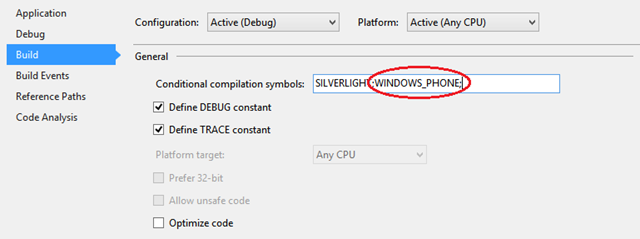Sharing Code with Conditional Compilation
August 27, 2014 in C# Mobile XPlatThis is a multipart series on how to share code between .Net platforms. All the examples will be showing how to share between Windows 8 Store applications and Windows Phone 8 application, but the techniques are useful for sharing code between any .Net/Xamarin platforms.
What is Conditional Compilation?
Conditional Compilation tells the compiler to selectively compile code. Many developers use these to run certain code only while in debug that they don’t want to run in production.
#if DEBUG
//do some stuff
#endif
How do I do it?
The first step would be to link a file between two projects. Then you can either use an existing Conditional Compilation Symbol or create your own. For example Windows Phone 8 defines SILVERLIGHT and WINDOWS_PHONE as Conditional Compilation Symbols. You see see what symbols have been defined by your project and even add your own by going to the Build tab in Project Properties.

To use the Conditional Compilation Symbols you just use the #if statement. For example if you are using a namespace exists in Windows Phone, but doesn’t exist in Windows 8 you could do this:
#if WINDOWS_PHONE
using System.IO.IsolatedStorage;
#else
using Windows.Storage;
#endif
The System.IO.IsolatedStorage using statement will only be compiled in the Windows Phone projects. The Windows.Storage using statement will be compiled in all other projects.
Have a comment or suggestion? This blog takes pull requests.Or you can just open an issue.